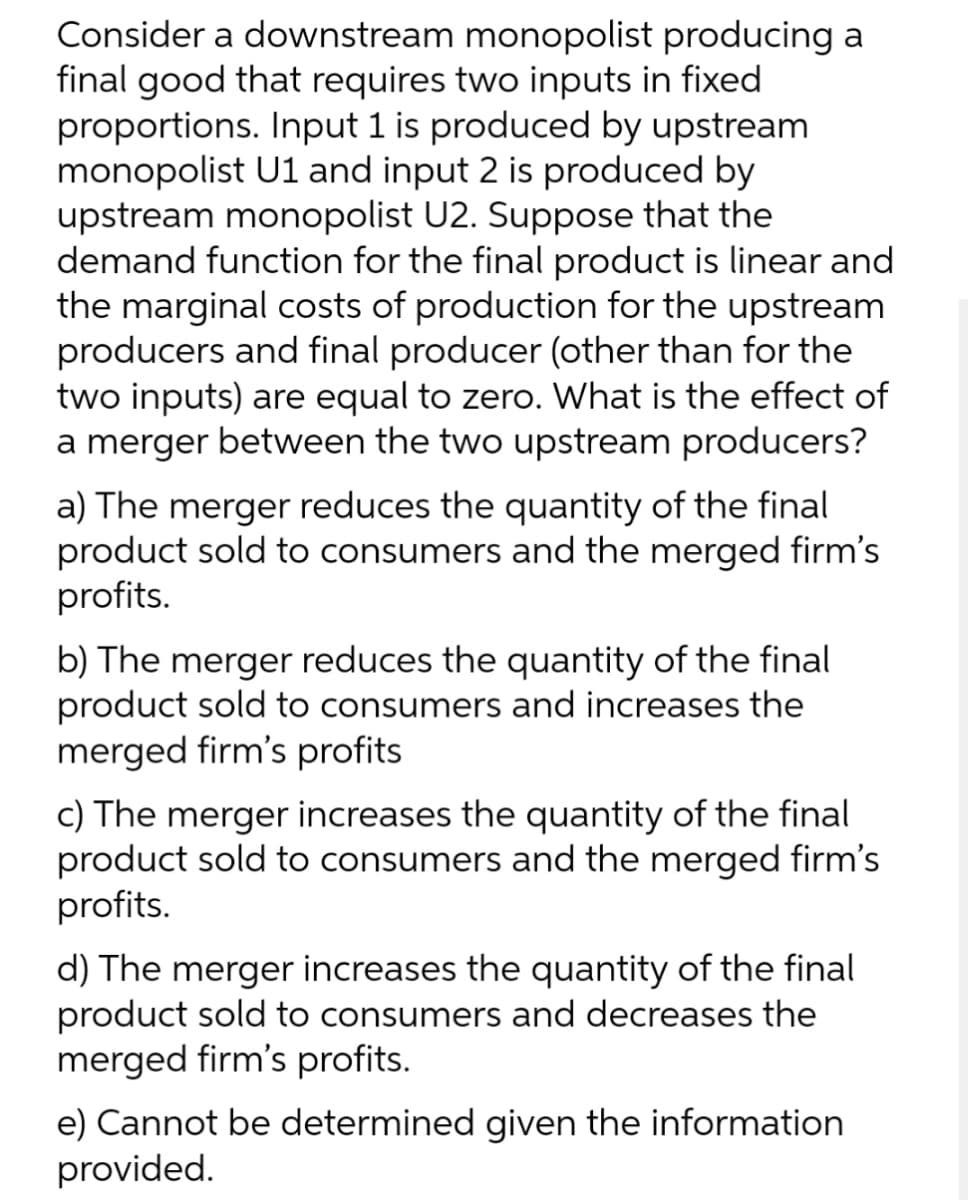Consider a downstream monopolist producing a final good that requires two inputs in fixed proportions. Input 1 is produced by upstream monopolist U1 and input 2 is produced by upstream monopolist U2. Suppose that the demand function for the final product is linear and the marginal costs of production for the upstream producers and final producer (other than for the two inputs) are equal to zero. What is the effect of a merger between the two upstream producers? a) The merger reduces the quantity of the final product sold to consumers and the merged firm's profits. b) The merger reduces the quantity of the final product sold to consumers and increases the merged firm's profits c) The merger increases the quantity of the final product sold to consumers and the merged firm's profits. d) The merger increases the quantity of the final product sold to consumers and decreases the merged firm's profits. e) Cannot be determined given the information provided.
Consider a downstream monopolist producing a final good that requires two inputs in fixed proportions. Input 1 is produced by upstream monopolist U1 and input 2 is produced by upstream monopolist U2. Suppose that the demand function for the final product is linear and the marginal costs of production for the upstream producers and final producer (other than for the two inputs) are equal to zero. What is the effect of a merger between the two upstream producers? a) The merger reduces the quantity of the final product sold to consumers and the merged firm's profits. b) The merger reduces the quantity of the final product sold to consumers and increases the merged firm's profits c) The merger increases the quantity of the final product sold to consumers and the merged firm's profits. d) The merger increases the quantity of the final product sold to consumers and decreases the merged firm's profits. e) Cannot be determined given the information provided.
Chapter14: Monopoly
Section: Chapter Questions
Problem 14.2P
Related questions
Question

Transcribed Image Text:Consider a downstream monopolist producing a
final good that requires two inputs in fixed
proportions. Input 1 is produced by upstream
monopolist U1 and input 2 is produced by
upstream monopolist U2. Suppose that the
demand function for the final product is linear and
the marginal costs of production for the upstream
producers and final producer (other than for the
two inputs) are equal to zero. What is the effect of
a merger between the two upstream producers?
a) The merger reduces the quantity of the final
product sold to consumers and the merged firm's
profits.
b) The merger reduces the quantity of the final
product sold to consumers and increases the
merged firm's profits
c) The merger increases the quantity of the final
product sold to consumers and the merged firm's
profits.
d) The merger increases the quantity of the final
product sold to consumers and decreases the
merged firm's profits.
e) Cannot be determined given the information
provided.
Expert Solution
This question has been solved!
Explore an expertly crafted, step-by-step solution for a thorough understanding of key concepts.
Step by step
Solved in 3 steps

Knowledge Booster
Learn more about
Need a deep-dive on the concept behind this application? Look no further. Learn more about this topic, economics and related others by exploring similar questions and additional content below.Recommended textbooks for you

